
We sent questions to three members of the Boulder & Lead routesetting team ahead of the competition taking place from 5-10 August. The team began their work on the day of the Opening Ceremony (Friday 26 July) and will have just over a week to finalise the routes and boulder problems that will determine Sport Climbing's second set of Olympic medallists.
Next up is Head Routesetter in Lead for the Paris 2024 Games, Martin Hammerer.
Martin Hammerer (AUT) - IFSC Head Routesetter Paris 2024 (Lead)
How did you get into competition setting?
Growing up in Innsbruck I was part of the local climbing group headed by Reini Scherer. When I was 13 there was a local kids' competition, where I was too old to compete, and Reini let me help with one of the qualification routes. Since then I basically just stuck around.
Do you typically set Lead rather than Boulder, or both?
As I grow older I find myself more setting Lead. I feel that competition setting in bouldering takes a high toll on the body, and I am not in the shape where I would want to be to continue setting Boulder competitions at the highest level.
Which discipline do you prefer setting and why?
They're just so different from a work-flow perspective. Bouldering is a lot more fast-paced, with more climbing going on, it's very easy to communicate inside the team, make adjustments, try again. In Lead it's a completely different rhythm, everything is slow and takes time, and because of this you take a lot more care before acting, you have to plan more, anticipate more. They are both super interesting and challenging, and I really enjoy doing both. Still, for setting at the highest level I will focus on Lead.
Do you have to maintain a certain level in your personal climbing in order to set at the high level required?
Yes, I think it's important to be at a certain level in your own climbing to do a good job in competition routesetting. That being said, I think the level necessary decreases with experience, so luckily as you get older you get away with not being in the best shape of your life. Also, the more important thing is that you're aware of your level, as well as of your strengths and weaknesses, compared to both the fields of athletes and the other members of your routesetting team. And of course the level you need also depends on the level of the other setters in the team, a lot can be compensated, if the team is selected well.
How do you think the Boulder & Lead format has affected the top athletes' Lead level - if at all?
I think the bigger impact was probably the Tokyo format, because this already forced a lot more athletes to train Lead at a high level, and also the youngsters grew up with the goal to be at the highest level in all disciplines. With the B&L format, the athletes just continued this path, getting rid of speed training. So, the level got higher, the field more dense, which is a process that would happen anyway, but I think for sure the Olympics acted as a kind of accelerator.
How does the new points scoring system in Lead impact your approach to setting a route?
The approach to setting a B&L lead route is quite different to a single-discipline lead route. In single-discipline events you do not care about the relative distances between the athletes so much, you only want a good split in the result. Also the risk of having tied scores is a little bit easier to accept compared to B&L, because having a countback to a previous round, you still have the same 'sport' to get a result.
With the B&L format, you really put the focus on a good separation, but also on making sure that the route is getting harder progressively, that there are no bumps in the intensity causing many athletes to fall off at the same place, giving everyone passing this move some 'easier' points. Then the differences in points between the athletes should also not be too different from the points scored in bouldering... how many points do you win in lead when you're 1st in the lead route compared to the person ranked 2, or 10? What are these differences in bouldering? For this we have guidelines from the IFSC telling us which point interval - e.g. the athlete being ranked 3rd - should be able to reach, and if both setting teams manage to hit this window, the result is quite balanced. I do believe that B&L will never be 'fully' balanced, even though we are trying, but still I consider the format to be quite robust, in the sense that to have a chance for the podium, you need to do well in both disciplines, or completely dominate one.
How does a Lead setting team usually work together? How do you divide work across the four routes to be set in Paris?
In World Cup Lead setting teams it's become quite typical to split the team by categories: half for men, half for women. This was our approach in the Olympic Qualifying Series and we will also do it like this in Paris, trying to keep the setters on the same categories, to get the best possible feeling for the intensity in this field.
Jan, Adam and Akito were involved in Tokyo 2020. Have they shared any advice on what they learned?
Yes. They were also involved a lot in the preparations for Paris, and their experience from Tokyo and the feedback they are giving is extremely valuable.
Will you use forerunners in Paris? Are they IFSC athletes?
No, we will not use forerunners in Paris. It is always tricky to extract the kind of information you really need from 'external' (of the routesetting team) forerunners, and having them (especially if they are IFSC athletes) would immediately raise concerns with the federations / other athletes.
How are you feeling ahead of Paris - what are your main concerns?
I'm really looking forward to starting the setting process. The competition wall and venue are outstanding, the best athletes will be there, the stakes are high - so everything is prepared to have an amazing competition. The main concerns are things you can't really control, which could throw us back in the timeline (weather, accidents, ...).
What are your hopes for the Lead routes?
One top in every route and perfect separation. But as this is quite hard to achieve, I'd also be happy to see an exciting competition with good vibes and high emotions.
- INTERVIEW: British Mountaineering Council CEO Paul Ratcliffe reflects on 2024 12 Feb
- INTERVIEW: Team GB Olympian Erin McNeice on her breakout 2024 season 11 Feb
- SKILLS: Push Your Grade: How to Climb Your First 7a Sport Route 6 Nov, 2024
- ARTICLE: Olympic Route Setter Garrett Gregor on Paris 2024 17 Sep, 2024
- ARTICLE: How did the Paris 2024 Olympic Games impact Sport Climbing Athletes' Instagram Followin 4 Sep, 2024
- ARTICLE: Meet the Paris 2024 Olympic Routesetters Part 3: Olga Niemiec, Boulder 4 Aug, 2024
- ARTICLE: Sport Climbing at Paris 2024: Schedule and How to Watch 30 Jul, 2024
- INTERVIEW: Meet the Paris 2024 Olympic Routesetting Team - Garrett Gregor 29 Jul, 2024
- INTERVIEW: GB Climbing Olympic Coach Rachel Carr on Paris 2024 24 Jul, 2024
- ARTICLE: Q&A with New BMC President Dominic Oughton 18 Jul, 2024



















































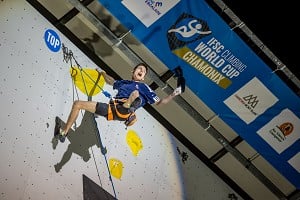
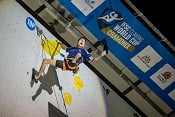

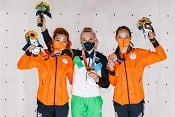
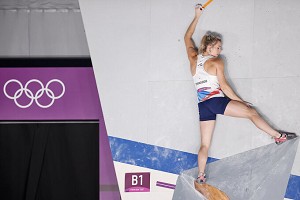
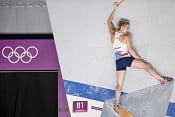


Comments